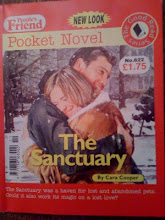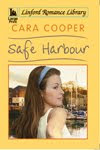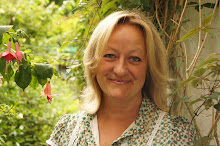Today on my blog I have the wonderful Jo Thomas (a fellow
Accent Press author) talking all about her book, The Oyster Catcher which has received rave reviews. Jo, do tell us about yourself and how you came to write your lovely book.

My name is Jo Thomas and I live in the Vale of Glamorgan with my husband, who’s a writer and producer, our three children, three cats, and our black lab Murray.
I write light-hearted romances about food, family, friendships, and love.
Why did you start writing?
I had my children in quick succession and when I started writing I had 3 children under the age of 3. Writing was my ‘me time’. I could go to that place in my head and make it as lovely and special as I wanted it to be while around me there were toys to be tidied, piles of washing, and play dates to organise. In fact, more often than not, I’d drop the eldest at school, the next one in nursery, and then the baby would fall asleep in the car and I’d stop wherever I was, park up, pull out my laptop, and start writing. I got some very funny looks from passers-by though.
Why romance?
I love romance. I suppose it all started with Little Women and then Gone with the Wind and then I started reading authors like Christina Jones, Katie Fforde, Carole Matthews, Wendy Holden, and I felt like I’d come home. These were the worlds I wanted to live in. At the end of a busy day running the children around to rugby, guitar lessons, drama lessons, swimming, I go to bed, pick up the book on top of my pile by my bed, and that’s me time too. Nothing bad happens in those worlds.
And then I realised that I wanted to tell these stories. I love the autumn and the winter. I love dusk when people start to put on their lights but haven’t shut their curtains yet and you get a peek into another world, and then I find I’m beginning to make up stories about the people who live there. It’s all in my head. It’s a happy place. I do believe that every story should have a happy ending, even if there’s been tears along the way.
Where do ideas come from?
I always want to change jobs or set up a new business. I’d like to set up restaurants or become a pig farmer or buy an oyster farm. So by writing about these things I’m actually living out all my ambitions.
I love cooking. I love feeding people. Sunday lunch is one of my favourite times of the week. My brother is a chef and I’m always picking his brains for ideas. One of my favourite times of the year is Christmas morning when he and I hole up in the kitchen, listening to Radio 2 with a Buck’s Fizz on the go, and cook Christmas dinner together. Actually I love it because he has to be the commis and I’m Chef!
My son loves cooking too and that’s becoming a really lovely and special thing to do together. I think that families and food and love go hand in hand.
I love the memories that food can bring back. The taste of something can take you right back to a special place, a special moment. Like bangers on Bonfire Night, or peppery mussels in a bikers lay-by in Brittany. Maine lobster on my honeymoon and toasted marshmallows on a Saturday night with the kids, watching X Factor.
Whenever we go on holiday, where most people would get out the travel guides, I get out the cookery books to see what kind of food we’re going to be eating. I’ve even been known to pack cookery books in my case.
But I’m a cook, just a simple cook. For me the pleasure is about sharing the food I’ve cooked, the wobbly three-tiered chocolate birthday cake, or the homemade pizzas on a Saturday night in front of the telly. Food is my way of saying, ‘I love you’.
What about research trips?
My stories have come out of places I’ve been and food I’ve eaten. But then once the idea is there, I usually find there’s more research to be done and this is when you really have to push yourself out or your comfort zone. But it’s good to feel the fear, like my heroines must.
I have been a waitress at a hells angels’ bikers convention, serving cooked breakfasts all day and night. I have taken part in the olive harvest in southern Italy, picking and harvesting the olives, going with the tractor to the local press and watching them being turned into wonderful deep-green olive oil. I have been oyster farming … in the middle of November!
The Oyster Catcher
What’s it about?
It’s about a jilted bride who hides away on an oyster farm in rural Connemara, despite being terrified of water and her wild and unpredictable new boss. Cutting herself off from everything she knows, she learns about oyster farming and the art of shucking oyster shells. She finally learns to come out of her own shell but along the way she has to battle oyster pirates, pearl princesses, and loan sharks before eventually finding love amongst the oyster beds of Galway Bay.
Where did the idea come from?
My husband was offered a job on the west coast of Ireland, in Galway, to work on an Irish-language soap opera there. We went over to see the place to decide if we would go as a family. From the moment we arrived it poured with rain. I’ve never known rain like it, and that’s after living in Wales. You couldn’t see your hand in front of your face. I decided that it wasn’t going to work, until that night when we went to a restaurant; a wonderful place called O’Grady’s. It’s an end cottage in a row of terraced cottages, painted light blue. You walk in and the fire is going, the candles are lit, and you look out over sea. And there I ate pacific oysters. I looked out of the cottage window and thought, OK, I get it. If this is what Galway has to offer, I’m in. And from then on I had some of the most amazing meals I’ve ever had, from wild foraged food, saffron sorbet , and the oysters, just wonderful. I thought, ‘this is sexy’. But it’s such a precarious business. And an idea began to form.
How did you research it?
Well, I started by eating a lot of oysters and going to O’Grady’s a lot. Then I discovered an oyster seller in one of the local farmers’ markets where you could buy half a dozen oysters, and he’d shuck them and serve them to you with a glass of white wine. It was a Friday lunchtime treat. I then went on a seafood cookery course at the Galway Seafood Centre. But it still wasn’t enough. I needed to get my feet wet, literally. By this time I was living back in Wales. So one dark, cold weekend in November I went with my good friend Katie Fforde to meet an oyster farmer friend of mine in Scotland. We dressed in wet weather gear from head to foot. As soon as we arrived we got stuck straight in and were wading into the water to see the bags of oysters that were being loaded onto the tractor trailer. Within minutes the water had come above the top of our wellies and was trickling down our socks. Then we retired to the pub for lunch. Absolutely soaked. There was steam rising from us as the barmaid stoked the fire for us to sit beside. Our feet didn’t thaw out at all. That afternoon, it lashed down. I’m realising the connection. Perhaps good clean rain helps the oysters. We worked in the shed, by the light of bare bulbs and to the sound of Radio 2 on an old radio, and helped grade and wash the oysters, ready to go to market. We caught crabs, listened for clunkers, and learnt to sniff for dead ‘uns. By the end of the day we were cold, wet, and very tired. We ordered large gins back at the hotel, handed the chef a large box of freshly picked oysters, and headed for our baths.
That evening, we sat by a huge roaring fire in a deep red restaurant room with my friend the oyster farmer, and drank champagne and ate the oysters we had picked from the sea ourselves. Never has anything tasted quite so good. It was perfection.
The Location. Why there?
The book is set in Connemara; I just loved its wild, rocky landscape. We spent a lot of time with friends out there who had the most amazing parties, where the children would enjoy the freedom of the outdoors and guests would turn up, music would happen, and everyone joined it. They were wonderful nights, even in the rain!
The characters, who are they?
The book is about people who hide their feelings away so they won’t get hurt. But if you hide away you won’t find love either.
Fiona Clutterbuck was abandoned by her own mother as a 15-year-old and has never really had the chance to realise who she is or what she’s capable of. In Ireland she’s a fish out of water. So when she’s finds herself having to battle loan sharks, pearl princesses, and oyster pirates she has to learn pretty quickly, to come out of her shell. Sometimes we don’t know what we’re capable of until we’re put in that situation. Sometimes it’s sink or swim.
Sean Thornton, Fiona’s boss, is grumpy and guarded but his saving grace is his passion about his oysters. He only comes alive when talking about the thing he loves. There’s Sean’s girlfriend, oyster broker Nancy, and the effervescent Margaret trying to turn her dying village back into something special again, along with a colourful cast of locals.
And then of course there’s Sean’s dog, Grace, a Great Dane. She’s based on a dog I met in Galway who used to ride his owner’s windsurf. So cool.
I once read that a champion shell shucker said ‘In order to open an oyster you first have to understand what’s keeping it closed.’ And that’s how the story started.

Here's a picture of Jo who is attracting wide attention in the press and soaring up the Amazon ratings:
You can buy the Oyster Catcher from Amazon by clicking this link:
Amazon
Or from
Accent Press by clicking this link.

 As part of research for a historical novel, I had the fascinating experience recently of going on a guided tour around Knole House in Kent while it was closed for refurbishments. The reason for the tour was to see some marks allegedly made during the 1500s to ward off witches. The house was to be visited by King James, a paranoid monarch (which Monarchs weren't in those times!) who wrote a book on hunting down witches and was responsible for much of the escalation in the persecution of hundreds of men and women.
The day was freezing cold and the whole area, deserted and eerie, extremely atmospheric. The National trust which has preserved the building superbly (though part of it is still lived in by the Sackville family) have been checking electrics and had taken the floorboards up in a room which had been reserved for the King's visit. The mysterious marks like a complex W were placed on a floor board which would have been to the left side of the bed (left being known to be the more sinister direction than the right-hand). It is thought they were scored into the oak beams by the carpenter work in the bedroom that was to be the King's and they have remained hidden all this time. You can see the under floor board marks on the National Trust's website. There were other marks such as circular ones I photographed (see above) in the great hall downstairs carved into a fireplace. Fireplaces were generally reckoned to be weak points where witches could gain access to a dwelling. I also photographed these ones carved into a stone fireplace. The marks were thought to tangle the witches up in the circles and the W's preventing them working their way into the house. Other things that we take for granted today, such as the placing of bay trees either side of a front door were all designed to deter witches.
It is difficult for us to understand such paranoia but there was huge persecution of witches during this time, not least by the self appointed witch finder general, Matthew Hopkins in the next century in England. I will shortly visit East Anglia to trace some of his rather hideous footsteps. The BBC programme 'In our time' with Melvin Bragg has a fascinating programme downloadable from iplayer on how the Reformation affected people's views on witches and led to the old magick which was primarily folklore and herbalism being feared and reviled as the times grew ever more uncertain during the period before, during and after the Civil War.
As part of research for a historical novel, I had the fascinating experience recently of going on a guided tour around Knole House in Kent while it was closed for refurbishments. The reason for the tour was to see some marks allegedly made during the 1500s to ward off witches. The house was to be visited by King James, a paranoid monarch (which Monarchs weren't in those times!) who wrote a book on hunting down witches and was responsible for much of the escalation in the persecution of hundreds of men and women.
The day was freezing cold and the whole area, deserted and eerie, extremely atmospheric. The National trust which has preserved the building superbly (though part of it is still lived in by the Sackville family) have been checking electrics and had taken the floorboards up in a room which had been reserved for the King's visit. The mysterious marks like a complex W were placed on a floor board which would have been to the left side of the bed (left being known to be the more sinister direction than the right-hand). It is thought they were scored into the oak beams by the carpenter work in the bedroom that was to be the King's and they have remained hidden all this time. You can see the under floor board marks on the National Trust's website. There were other marks such as circular ones I photographed (see above) in the great hall downstairs carved into a fireplace. Fireplaces were generally reckoned to be weak points where witches could gain access to a dwelling. I also photographed these ones carved into a stone fireplace. The marks were thought to tangle the witches up in the circles and the W's preventing them working their way into the house. Other things that we take for granted today, such as the placing of bay trees either side of a front door were all designed to deter witches.
It is difficult for us to understand such paranoia but there was huge persecution of witches during this time, not least by the self appointed witch finder general, Matthew Hopkins in the next century in England. I will shortly visit East Anglia to trace some of his rather hideous footsteps. The BBC programme 'In our time' with Melvin Bragg has a fascinating programme downloadable from iplayer on how the Reformation affected people's views on witches and led to the old magick which was primarily folklore and herbalism being feared and reviled as the times grew ever more uncertain during the period before, during and after the Civil War.
















.JPG)



















